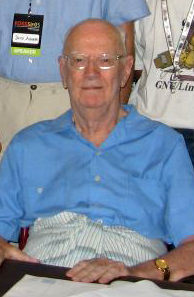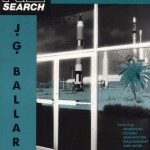Arthur C. Clarke (1917-2008 R.I.P.) – Fractals – The Colors Of Infinity
Monday, December 24th, 2007Arthur Clarke – Fractals – The Colors Of Infinity part 1 of 6
Arthur C. Clarke
Da Wikipedia, l’enciclopedia libera.
Sir Arthur Charles Clarke (Minehead, 16 dicembre 1917 – Colombo, 19 marzo 2008) è stato un autore di fantascienza e inventore britannico.
Clarke è ai più noto per il suo romanzo 2001: Odissea nello spazio. Ispirato al racconto breve La sentinella (The Sentinel – 1948) dello stesso Clarke, il romanzo è in realtà cresciuto assieme alla sceneggiatura del film 2001: Odissea nello spazio realizzato con il regista Stanley Kubrick.
Clarke ha però al suo attivo una produzione letteraria assai estesa, tra cui la celebre serie di Rama, che alcuni considerano come una sorta di seguito di 2001. Esiste poi un asteroide (4923 Clarke)
battezzato così in suo onore. Sempre in suo onore è stata chiamata
"Fascia di Clarke" l’orbita geostazionaria della terra. Egli infatti fu
il primo che ipotizzò, in un suo romanzo, l’utilizzo dell’orbita
geostazionaria per i satelliti dedicati alle telecomunicazioni.
Trovandosi sulla fascia di Clarke tutti i satelliti televisivi, una
ditta tedesca di produzione di ricevitori satellitari ha pensato di
prendere il nome di Clarke-Tech e dunque anch’essa deve il suo nome
allo scrittore.
È considerato un autore di fantascienza hard o "classica", dato che una caratteristica saliente dei suoi romanzi è l’attenzione per la verosimiglianza scientifica.
|
Indice
|
Biografia [modifica]
Arthur Charles Clarke nacque a Minehead, nel Somerset (Inghilterra), il 16 dicembre del 1917.
Da ragazzo, Clarke si divertiva leggendo con trasporto ed entusiasmo
vecchie riviste di fantascienza. Dopo le scuole superiori (secondarie), non riuscì ad entrare in nessun college e di conseguenza iniziò a lavorare. Il suo primo lavoro fu di revisore dei conti per il governo.
Durante la seconda guerra mondiale, lavorò per la Royal Air Force come esperto di radar
e fu coinvolto nel successivo sviluppo del sistema di difesa radar che
aveva consentito alla RAF di vincere la battaglia contro gli invasori nazisti. Dopo la guerra si laureò al King’s College di Londra.
Il suo più importante contributo può essere considerato l’idea che i satelliti geostazionari potrebbero essere il sistema ideale per le telecomunicazioni: propose questo concetto in un articolo scientifico dal titolo Can Rocket Stations Give Worldwide Radio Coverage? ("Possono le stazioni razzo fornire una copertura radio mondiale?"), pubblicato su Wireless World nell’ottobre del 1945. Proprio grazie a questo contributo, l’orbita geostazionaria è oggi nota anche come orbita Clarke o fascia di Clarke in suo onore.
Nei primi anni quaranta,
mentre militava ancora nella RAF, iniziò a vendere le sue storie di
fantascienza alle riviste del settore. Lavorò anche, per breve tempo
come viceredattore (Assistant Editor) al Science Abstracts, prima di dedicarsi a tempo pieno al mestiere di scrittore (1951). È stato anche presidente della British Interplanetary Society ("Società interplanetaria britannica") e membro dell’Underwater Explorers Club ("club degli esploratori subacquei").
Dal 1956 ha vissuto nello Sri Lanka, a Colombo, dove è scomparso il 19 marzo 2008 all’età di 90 anni per una crisi respiratoria.[1]
Il 26 maggio del 2000 è stato insignito della carica onorifica di "Knight Bachelor" in una cerimonia a Colombo per i suoi meriti nella letteratura. L’investitura veniva ritardata, su richiesta di Clarke, dal 1998 a causa di una accusa di pedofilia da parte del tabloid inglese The Sunday Mirror, accusa che fu comunque considerata senza basi dalla polizia dello Sri Lanka e ritrattata su carta poco dopo.[2] [3]
A dicembre del 2007, in occasione del suo novantesimo compleanno (come dice Clarke «dopo aver completato 90 orbite intorno al sole») ha registrato un messaggio video [4] pubblicato su YouTube.
Opere [modifica]
Ciclo Odissea nello Spazio [modifica]
- 2001: Odissea nello spazio (2001: A Space Odyssey, 1968), Editrice Nord (ISBN 8842912484)
- 2010: Odissea due (2010: Odyssey Two, 1982), BUR (ISBN 8817136093)
- 2061: Odissea tre (2061: Odyssey Three, 1987)
- 3001: Odissea finale (3001: The Final Odyssey, 1997)
Ciclo di Rama [modifica]
- Incontro con Rama (Rendez-Vous with Rama, 1973), Mondadori Urania n. 634
- Rama II (Rama II, 1989) coautore con Gentry Lee
- Il giardino di Rama (The Garden of Rama, 1991) coautore con Gentry Lee
- Rama rivelato (Rama Revealed, 1993) coautore con Gentry Lee
Altri romanzi [modifica]
- Le sabbie di Marte (The Sands of Mars, 1951), Mondadori Urania n. 1 e 402
- Ombre sulla Luna (Earthlight, 1951), Mondadori Urania n. 145 e 522
- Preludio allo spazio (Prelude to Space, 1951), Mondadori Urania n. 19
- Isole cosmiche (Islands in the Sky, 1952), Mondadori Urania n. 54
- Le guide del tramonto (Childhood’s End, 1953), Mondadori Urania n. 467
- La città e le stelle (The City and the Stars, 1956), Mondadori Urania n. 158 e 456
- I guardiani del mare (The Deep Range, 1957), Mondadori Urania n. 278
- Racconti dal pianeta Terra (Tales from the White Hart, 1957)
- Polvere di Luna (A Fall of Moondust, 1961), Mondadori Urania n. 281
- Le porte dell’oceano (People of the Sea, 1963), Mondadori Urania n. 373
- Terra Imperiale (Imperial Earth, 1975), Mondadori Urania n. 688
- Le Fontane del Paradiso (The Fountains of Paradise, 1979), Mondadori Urania n. 796
- Culla (Cradle, 1988) coautore con Gentry Lee, Rizzoli
- Voci di Terra lontana (The Songs of Distant Earth, 1986), Rizzoli
- Il fantasma del Titanic (The Ghost from the Grand Banks, 1990), Rizzoli
- Oltre il buio della notte (Beyond the Fall of Night, 1990) coautore con Gregory Benford
- La luce del passato (The Light of Other Days, 2000), Rizzoli (ISBN 8817126322) coautore con Stephen Baxter
- L’occhio del tempo (Time’s Eye, 2003), Editrice Nord (ISBN 8842913561) coautore con Stephen Baxter
- L’occhio del sole (Sunstorm, 2005), Editrice Nord coautore con Stephen Baxter
Antologie di racconti [modifica]
(elenco parziale)
- All’insegna del Cervo Bianco (Tales from the White Hart, 1957), Mondadori Urania n. 367 e 884
- Storie di Terra e Spazio (Tales of Ten Worlds, 1962), Mondadori Urania n. 1039
- Vento solare (The Wind from the Sun, 1972)
- Spedizione di soccorso, Mondadori Urania Classici n. 17
- La sentinella (The Sentinel, 1983), Mondadori Urania n. 514; NET (ISBN 8851521549)
- Racconti dal pianeta Terra (Tales from Planet Earth, 1990)
Antologie che contengono suoi racconti [modifica]
Titoli pubblicati in italiano (elenco parziale)
- Otto racconti, Mondadori Urania n. 321
- Per tutti i diavoli dell’universo (1977)
- I grandi maestri della fantascienza 2 (The SFWA Grand Masters: Vol. 2, 2002)
Racconti [modifica]
(elenco parziale)
- Viaggiate via cavo (Travel by Wire!, 1937) – uscito come appendice ad Urania n. 844
- I nove miliardi di nomi di Dio (The Nine Billion Names of God, 1967)
- La stella (noto anche come La cripta) (The Stars, 1955, Premio Hugo nel 1956)
Citazioni [modifica]
Clarke formulò le seguenti tre leggi sulla previsione:
| « Quando un anziano affermato scienziato dichiara che qualcosa è possibile, ha quasi certamente ragione; quando dichiara che qualcosa è impossibile, ha probabilmente torto. » |
| « L’unico modo di scoprire i limiti del possibile è avventurarsi un poco oltre, nell’impossibile. » |
| « Ogni tecnologia sufficientemente avanzata è indistinguibile dalla magia. » |
Note [modifica]
- ^ [1] Times edizione on line del 19/3/2008
- ^ Sci-fi novelist cleared of sex charges. URL consultato il 2008-02-11.
- ^ GOVERNO SRI LANKA: "NESSUNA ACCUSA DI PEDOFILIA CONTRO ARTHUR CLARKE". URL consultato il 2008-03-23.
- ^ Video in occasione dei novanta anni. URL consultato il 06-01-2008.
Altri progetti [modifica]
 Wikiquote contiene citazioni di o su Arthur C. Clarke
Wikiquote contiene citazioni di o su Arthur C. Clarke
Collegamenti esterni [modifica]
- Scheda su Arthur C. Clarke dell’Internet Movie Database
- Bibliografia italiana
- (EN) Autori affini a Clarke su Literature Map
xxx






































